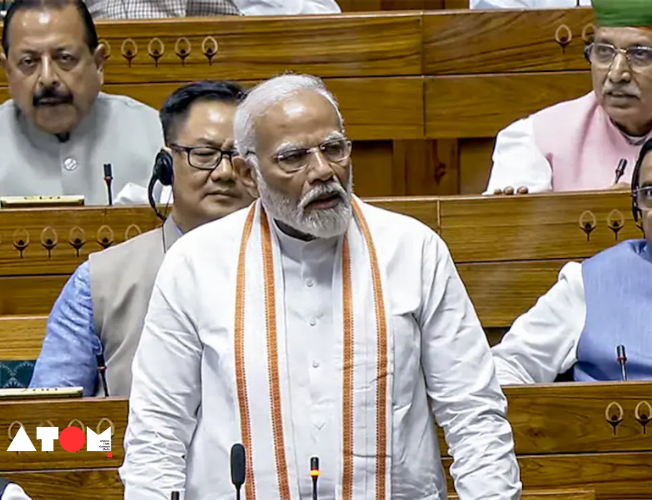Prime Minister Narendra Modi will respond to the Motion of Thanks for the President’s Address today, after the Leader of the Opposition in the Lok Sabha, Rahul Gandhi, for his vehement speech. There have been heated debates and discussions during the current Parliament session, bringing to light important concerns that the country is currently facing.
Parliamentary Proceedings
On July 1, the 16-hour Motion of Thanks debate began amid hiccups, mostly related to the leak of the NEET exam material. This evening’s conclusion of the discussion is anticipated to make way for PM Modi’s speech. Rahul Gandhi’s passionate address in the Lok Sabha provoked strong debates and criticism of the ruling BJP.
Contentious Points
Parts of Gandhi’s statement were removed from recordings due to the Treasury benches’ strong reaction over his remarks regarding the BJP leadership and concerns like the NEET exam leak. In response, Modi denied accusations and emphasised government efforts, paving the way for a heated debate in parliament.
Upcoming Address
PM Modi’s first speech to the legislature after his reelection is today, highlighting the necessity for the BJP to work with allies in a balanced legislative environment. The government’s goals and tactics for the current session will also be outlined in his speech to the parliamentary party of the National Democratic Alliance.
Context and Background
Members of both chambers debate the government’s policies and directions during the Motion of Thanks discussion, which is an important legislative ritual that takes place after the President’s Address. The heated national discourse this year has been heightened by the recent election results.
Significance of the Debate
The legislative session is extremely important, especially in light of the recent electoral dynamics in which the BJP, albeit gaining a sizable number of seats, depends on its partners for a majority. In the context of a varied political environment, it establishes the tone for legislative priorities and governance.
Rahul Gandhi’s Speech
The tone and content of Rahul Gandhi’s address as Leader of the Opposition were noticeably different. He made a direct assault on the BJP, charging its leaders with dividing the party and handling important matters like the NEET exam leak improperly. Strong rebuttals and legislative altercations followed his remarks.
Expunged Remarks
Gandhi’s speech was edited to exclude references to the BJP leadership and particular government projects in response to criticism from members of the ruling party. This demonstrates how divisive political debate is in the Indian Parliament.
Modi’s Response Anticipation
The content of Prime Minister Modi’s statement, as well as the strategic course it would take the government’s policies and legislative agenda, are all highly anticipated. His capacity to respond to criticism from the opposition and mobilise support for important initiatives will be closely observed.
Policy and Governance
As it begins its third consecutive term in office, the Modi administration must deal with social challenges made worse by the pandemic in addition to maintaining economic growth. He’s probably going to focus a lot of his speech on important policy topics like digital transformation, infrastructure development, and healthcare reform.
Economic Outlook
The argument has centred on India’s economic trajectory under Modi’s leadership, with proponents hailing reforms and critics drawing attention to issues like inflation and unemployment. It is anticipated that his speech today would include policies to support economic recovery and guarantee inclusive growth.
Foreign Policy and Security
India’s foreign policy aims are crucial in light of changing geopolitics and worries about regional security. The way that PM Modi views border security, international relations, and strategic alliances will shed light on India’s diplomatic approaches in a world that is changing quickly.
Alliance Dynamics
The National Democratic Alliance (NDA), which is the alliance between the BJP and a number of regional parties, adds another level of complication to legislation. One of Modi’s most important leadership responsibilities continues to be preserving unity within the alliance while negotiating a variety of regional concerns.
Technology and Innovation
Initiatives like Made in India and Digital India have gained significance as India becomes a digital superpower. The goal of Modi’s administration is to establish India as a leader in the global IT sector by utilising technology for e-governance, digital literacy, and inclusive growth.
Environmental Concerns
In India’s policy discourse, environmental sustainability and adaptation to climate change are becoming more and more popular. Today’s speech is expected to touch on Modi’s green initiatives and his pledges to renewable energy, which demonstrate his balanced approach to conservation and development.
Social Welfare
Rural development, women’s empowerment, and social welfare programmes aimed at underprivileged populations continue to be key components of Modi’s governance agenda. The initiatives taken by his government to increase housing, healthcare, and educational opportunities are essential parts of inclusive growth plans.
Results
The way that Prime Minister Narendra Modi answered the Motion of Thanks discussion will have a big impact on how India is run politically and in terms of governance. Modi’s speech will provide direction to policy, economic priorities, and strategic initiatives as the nation works through many opportunities and challenges.





